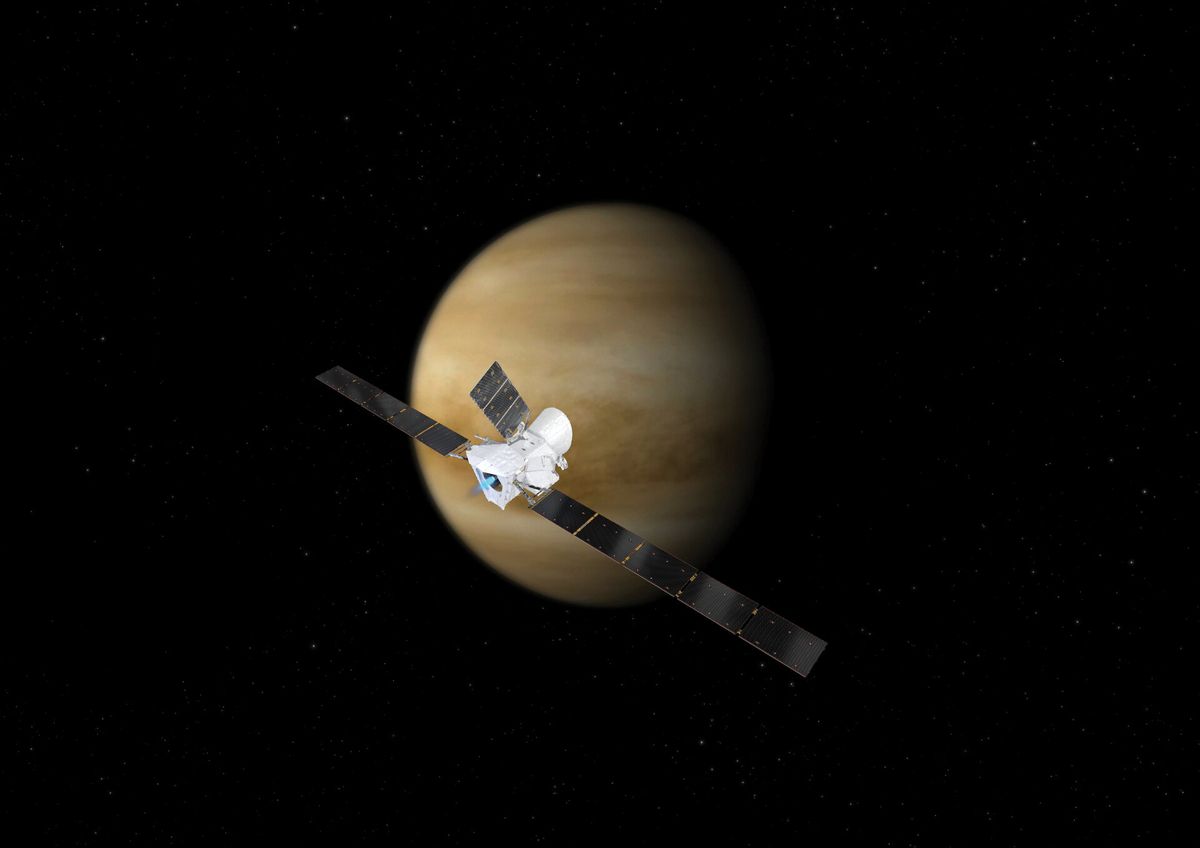
An abundance of gases, including carbon and oxygen, are being stripped away from Venus' atmosphere, according to flyby data from Europe's BepiColombo space probe. This data was obtained as the Mercury-bound spacecraft flew past Venus, and could shed new light on the leaky atmosphere of our planetary neighbor. Down the line, the findings could help scientists catalog the makeup of Venus' fragile magnetic environment as well.
Unlike Earth, a planet with an intrinsic magnetic field that protects its atmosphere from escaping into the depths of space, Venus does not possess its own, stable magnetic field. That is because its cooler interior cannot slosh around molten material, a swirling necessary to create and sustain a magnetic field. Rather, sunlight battering on the amber-hued orb charges up its atmospheric atoms, which then create electric currents that produce an unstable, sunlight-dependent magnetosphere.
In August 2021, BepiColombo flew through this weak, comet-shaped magnetosphere for 90 minutes to slow down and adjust its course while heading toward its ultimate target, Mercury. Scientists analyzing data from the spacecraft's fleeting visit, however, found some valuable Venusian information. Charged particles, or ions, appeared to be escaping the planet due to sunlight accelerating molecules in the atmosphere to extremely high speeds. Those speeds were high enough, in fact, that the ions even escaped the planet's gravity and flowed out into space.
Related: Europe's BepiColombo spacecraft zooms within 150 miles of Mercury in close flyby
"These are heavy ions that are usually slow moving, so we are still trying to understand the mechanisms that are at play," Lina Hadid, a researcher at the Plasma Physics Laboratory in France who led the new analysis, said in a statement.
Venus' thick, hellish atmosphere is dominated by carbon dioxide, but also holds fewer amounts of nitrogen and other trace gases. Scientists previously knew tiny amounts of oxygen lofted in Venus' night-side and, last November, a different team of researchers detected the molecule on the planet's day-side too. The latter team further concluded that Venus' oxygen concentration drops in tandem with decreasing solar radiation.
Investigating the loss of these molecules and their escape mechanisms "is crucial to understand how the planet's atmosphere has evolved and how it has lost all its water," study co-author Dominique Delcourt, who is also a researcher at the Plasma Physics Laboratory, said in the same statement.
BepiColombo is nearing the end of its seven-year journey and is expected to reach Mercury in late 2025. Meanwhile, a fleet of robotic visitors are scheduled to visit Venus in the coming decade. Europe's Envision spacecraft aims to launch in 2031 while NASA's DAVINCI, originally slated for a 2029 launch, was delayed to 2031.
The resurrected VERITAS mission is now scheduled to launch no earlier than 2031 as well, although team members are still advocating for an earlier launch in November 2029.
This research is described in a paper published Friday (April 12) in the journal Nature Astronomy.
https://news.google.com/rss/articles/CBMiQ2h0dHBzOi8vd3d3LnNwYWNlLmNvbS9iZXBpY29sb21iby1jYXJib24tb3h5Z2VuLXZlbnVzLXNwYWNlLW1pc3Npb27SAQA?oc=5
2024-04-15 21:00:01Z
CBMiQ2h0dHBzOi8vd3d3LnNwYWNlLmNvbS9iZXBpY29sb21iby1jYXJib24tb3h5Z2VuLXZlbnVzLXNwYWNlLW1pc3Npb27SAQA
Bagikan Berita Ini















0 Response to "Venus is leaking carbon and oxygen, a fleeting visit by BepiColombo reveals - Space.com"
Post a Comment